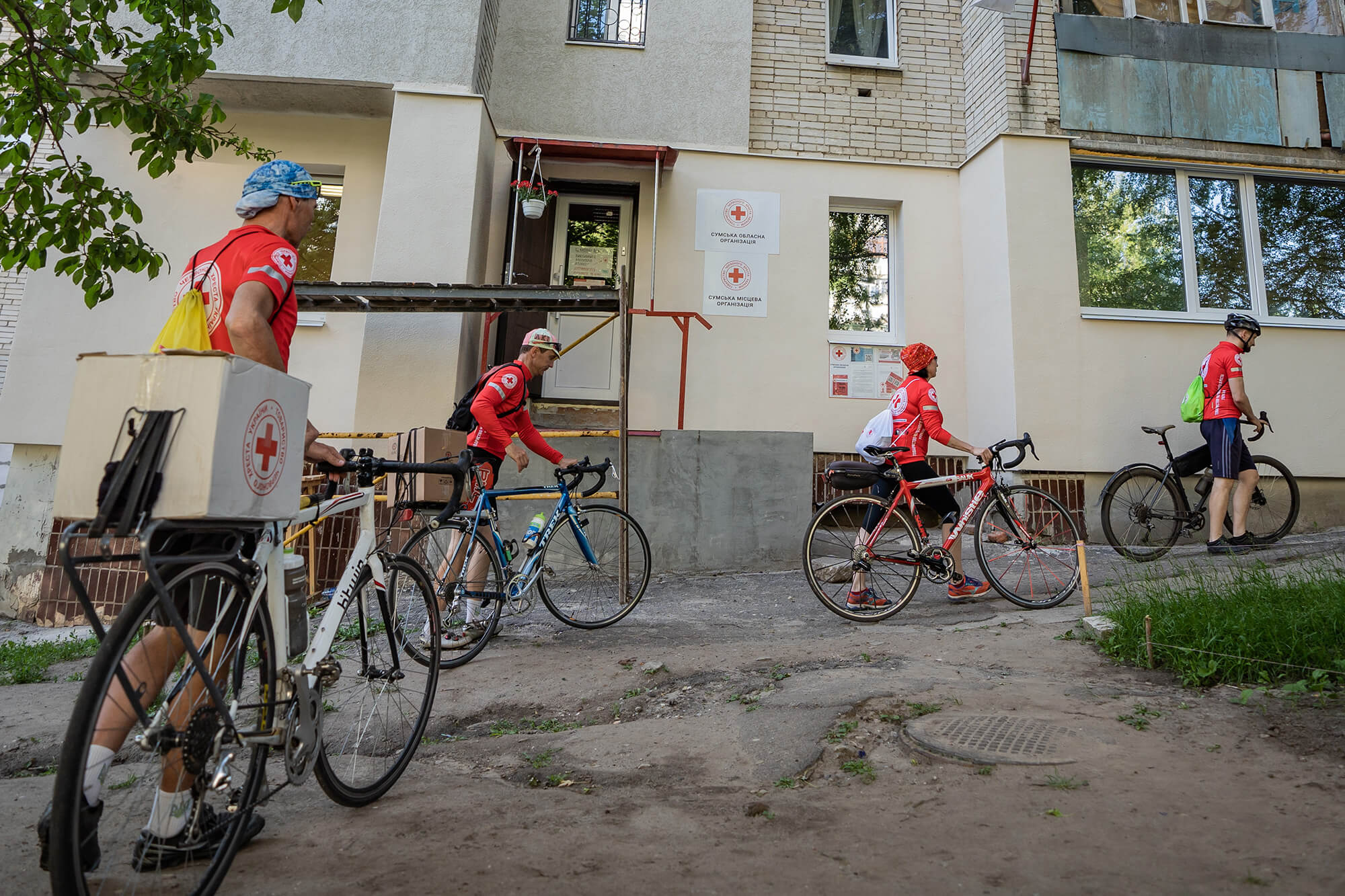
Crusaders on Wheels
When Russian troops surrounded the city of Sumy at the beginning of the full-scale invasion, life came to a standstill. Only a few pharmacies were open. There was not enough bread. Gas stations ran out of gasoline, and cars disappeared from the streets. Then, a group of people who used to organize bicycle races in Sumy before the war rushed to the aid of elderly residents who could no longer cope due to illness or isolation.
The people on bikes were ready to help, and joined forces with the local chapter of the Red Cross. They became a bicycle squad that delivered food and medicine while military fighting was taking place on the outskirts of Sumy.
They continue to volunteer today and call themselves ‘crusaders on wheels.’
*
On February 24, 2022, right before noon, Russian tanks rolled through the streets of Sumy. locals saw them, if not from their windows, then from the surveillance cameras outside their homes. In one of the suburbs, fighting began during daylight; in another, near the Cadet Corps, a local military school, it began at dusk. The first wounded people were taken to the city hospital. Three out of nine died.
By nightfall, fighting resumed near the Cadet Corps. The Church of Holy Righteous John of Rus and the military school checkpoint were in flames. They call this neighborhood ‘military campus’: It is home to a department for training reserve officers of one of the universities, the facilities of the 27th Artillery Brigade, and a military recruitment office.
The next morning, the enemy retreated. However, on March 3, a rocket hit the city. At that time, only six pharmacies were open in Sumy, and people could only buy bread from ten stalls of the bread factory.
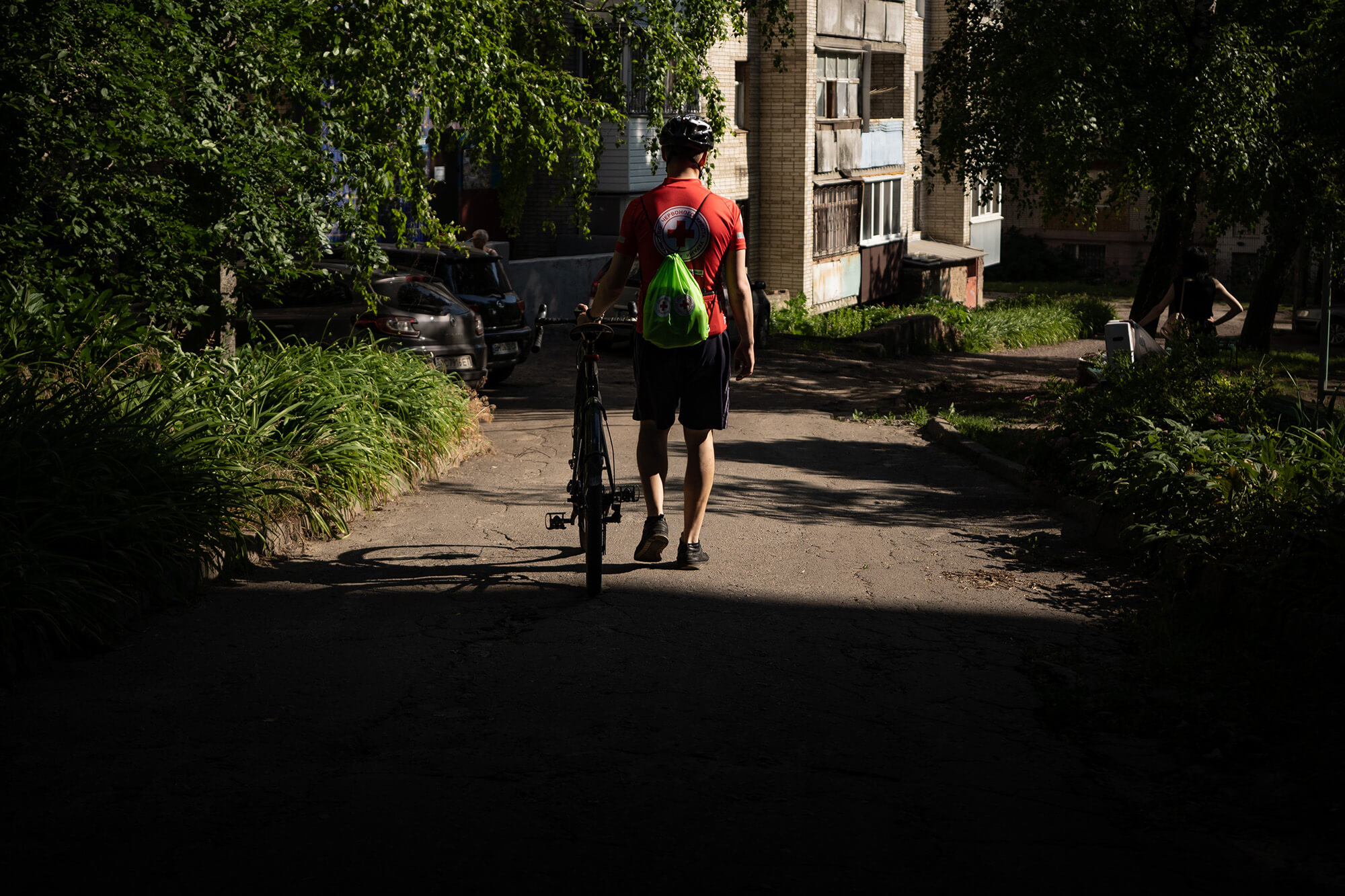
Later, people in Sumy would venture out to stop a convoy of Russian tanks with their bare hands. They stopped it. They even took prisoners of war.
On the night of March 8, Russian bombers dropped three bombs on the residential area, killing 22 people—including three generations of a single family.
At dawn on March 21, Russians would hit the reservoir of Sumykhimprom, a chemical plant, causing ammonia to leak. Street fighting would alternate with airstrikes. Russians would attack homes, schools, substations, and boiler facilities….
Around this time, a group of brave souls rode bicycles through Sumy to buy medicine and bring it to those who were having trouble caring for themselves. The Russians were still surrounding the city.
Candy in exchange for silence
“Girls, would you like some candy?” Maryna asks three children playing on a playground nearby. “I can give it to you if you play a little quieter.” Maryna turns to me and says, “It’s not the first time I’ve bought silence with candy. Those swings used to squeak like crazy, and when you hear that all day long…”
June 2023. We are sitting on a bench in a courtyard, surrounded by several apartment buildings. On the first floor of one of the buildings, directly opposite the swing, a local chapter of the Ukrainian Red Cross Society has its office. When the full-scale invasion began, Maryna Moroz came here on her bicycle to offer her help.
“I couldn’t just sit around and do nothing. I brought my mother home from the hospital, gave blood, helped weave camouflage nets, and donated some money, but I wanted to get more involved,” she says.
This organization was not special to her — she just happened to know Ihor Shapoval, the head of the regional chapter, for a decade. If she had not known him, she would have gone somewhere else. They took her in, of course, because, at that time, every volunteer was a godsend. So, in early March, Maryna put on a red vest that allowed her to cut in lines, mounted her bicycle, and went to all the open pharmacies on a hunt for medicine.
“We were not allowed to do that. We did not have a license, and we were not allowed to store medicines in an inappropriate space. But people kept coming to us for help,” Maryna says.
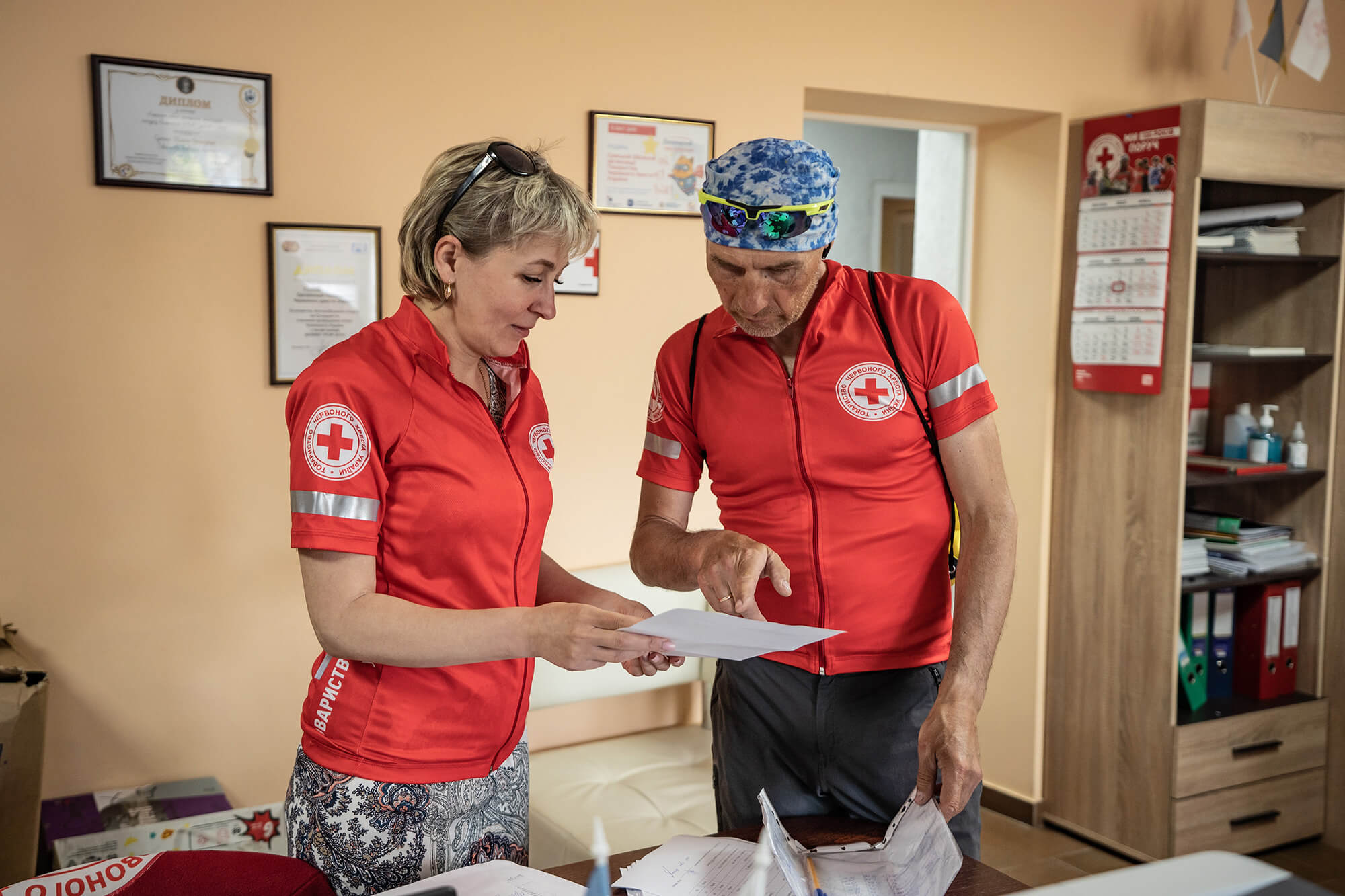
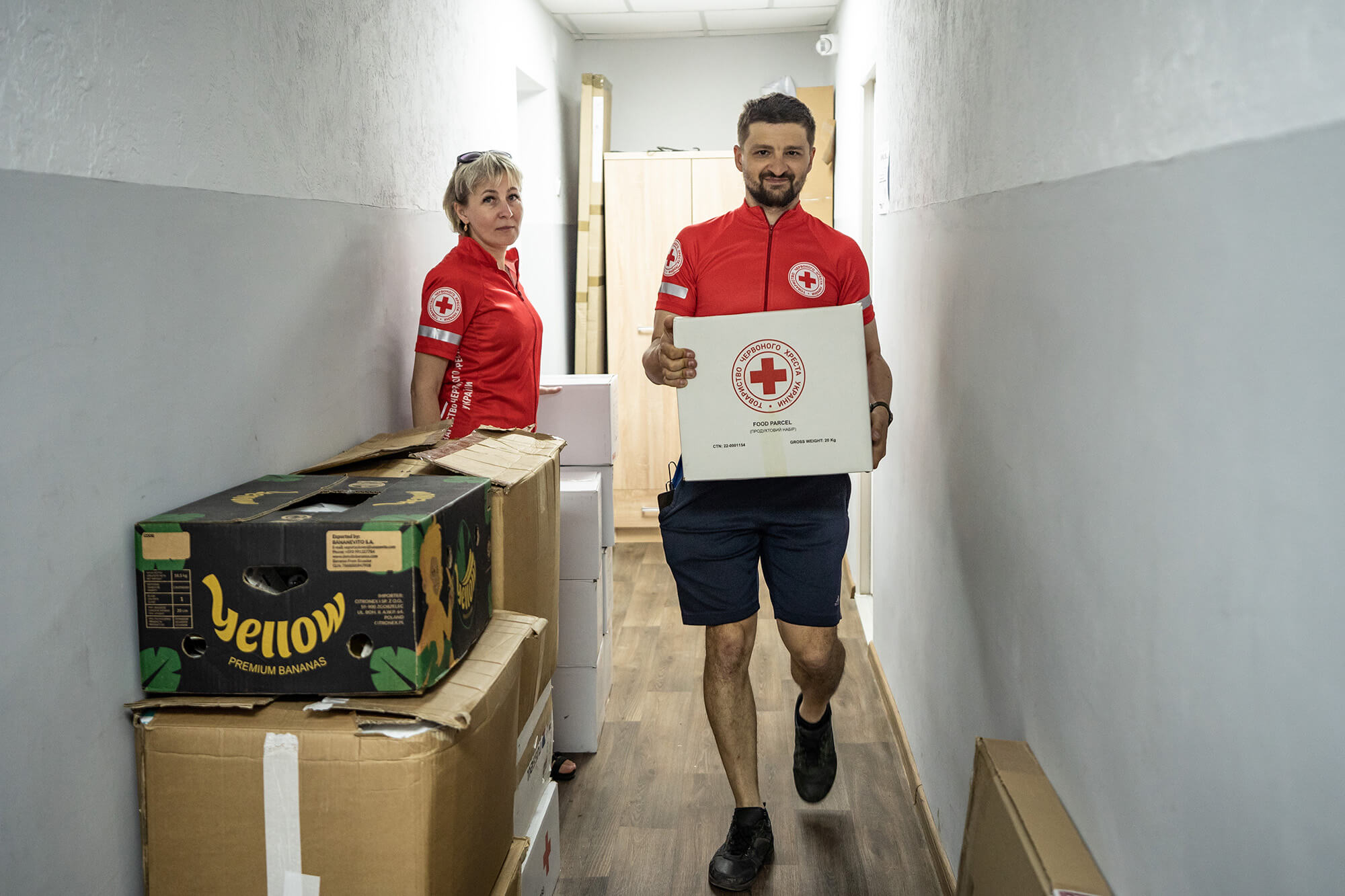
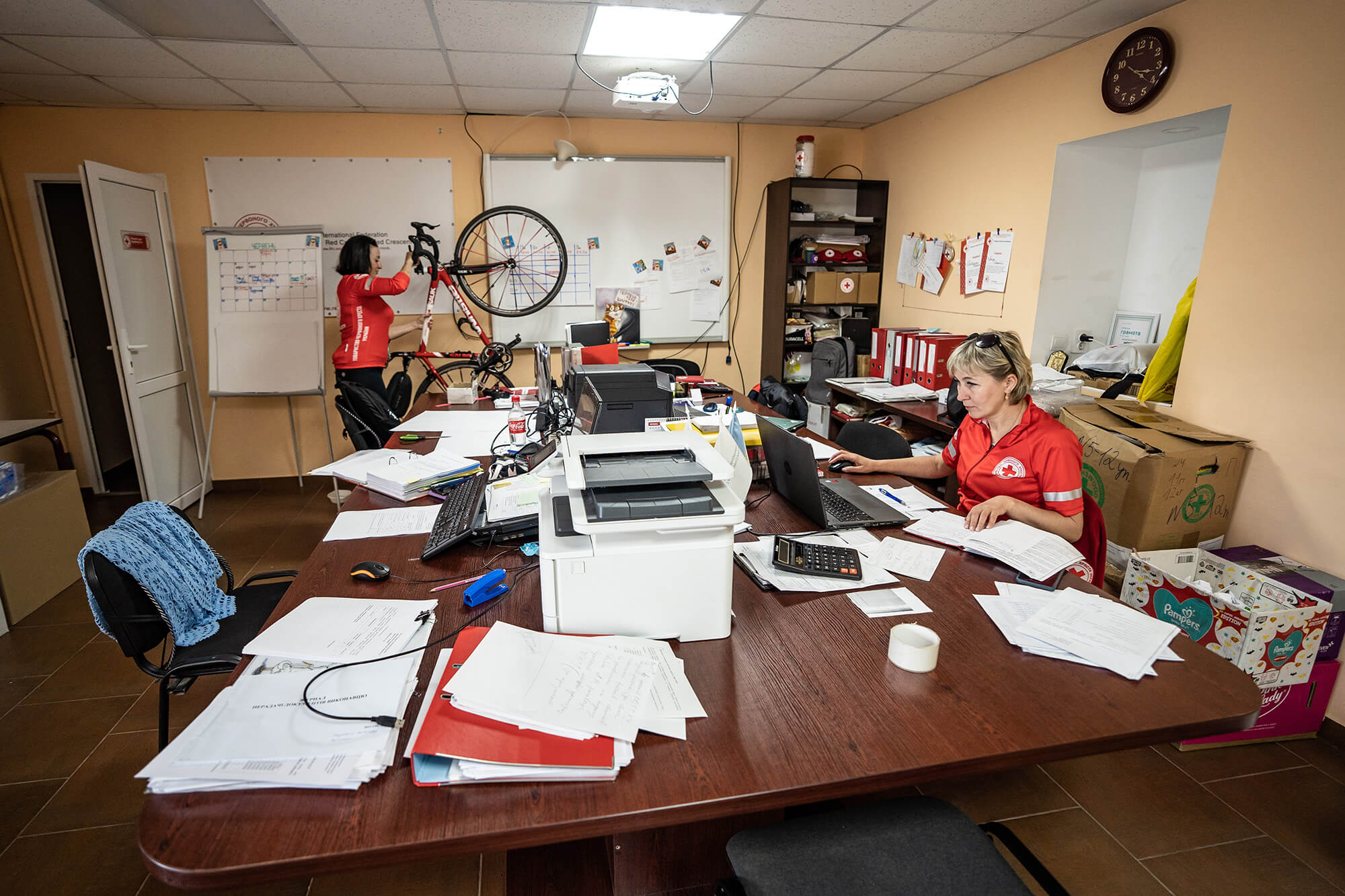
She was the first randonneur (a cyclist who participates in long-distance races, or brevets) to come to the Red Cross and offer help. At that time there were few cars on roads, few grocery stores and pharmacies were open, fuel was rationed, and many elderly people who were sick or alone had no access to medicine or food.
Later, other members of the Sumy Randonneuring Club became volunteers on bicycles. They collected bags of humanitarian supplies and took them to those who needed them the most. Rice, pasta, sugar, canned goods—food for survival during the siege. Diapers for adults and children, hygiene items, bedding and blankets for the IDPs. Medicine for hypertension, blood pressure, and epilepsy quickly became scarce. There were shortages of insulin and hormones. If they were lucky enough to find them, they divided them among the people so everyone got at least something. Riding also became a kind of lifesaver for the randonneurs themselves. They say it gave them a chance to get their thoughts in order.
Old people in all districts of Sumy welcomed them like family . They invited them to their homes for tea or even a strong drink. The randonneurs politely declined. Sometimes they agreed to help themselves to apples or buns and every once in a while to a jar of jam.
When their colleagues at the International Committee of the Red Cross heard about the bicycle squad, they wanted to do something to thank them and have branded jerseys sewn for them. The randonneurs agreed, but on the condition that they would commission the jerseys from a Ukrainian manufacturer they did not know personally but from whom they had already commissioned some cycling uniforms. The jerseys turned out perfectly.
This volunteer bicycle squad is the only one in Ukraine. If someone were to calculate how much money the organization saved thanks to the randonneurs, they would come up with a nice figure. 6-8 cyclists delivered humanitarian aid to 4-5 addresses each day for several months. In a besieged city, it would have been impossible to deliver so much, given the street fighting and fuel shortages that prevailed after the region’s liberation.
People with bicycles
Maryna could not ride a bicycle until she was 14 but was eager to learn. Her parents thought riding a bike in the city was too dangerous, especially for a girl. Her dream came true in her native Donetsk region (she was a little girl when her family moved from Donetsk to Sumy). Her uncle offered to teach her on her next visit to Donetsk. After returning home, Maryna applied to a cycling school. But they did not accept her because she was the only girl, and there was no one to train her.
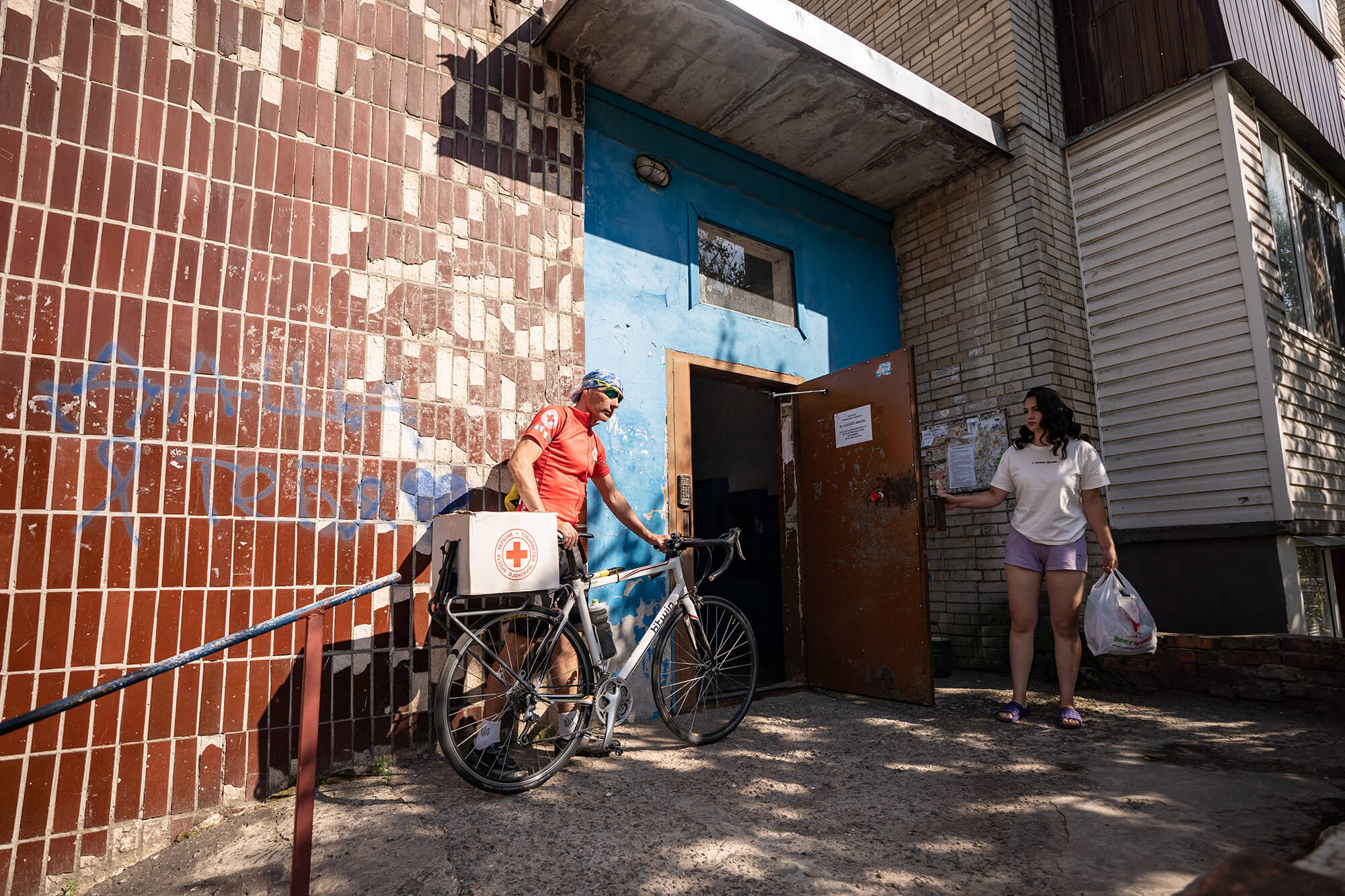
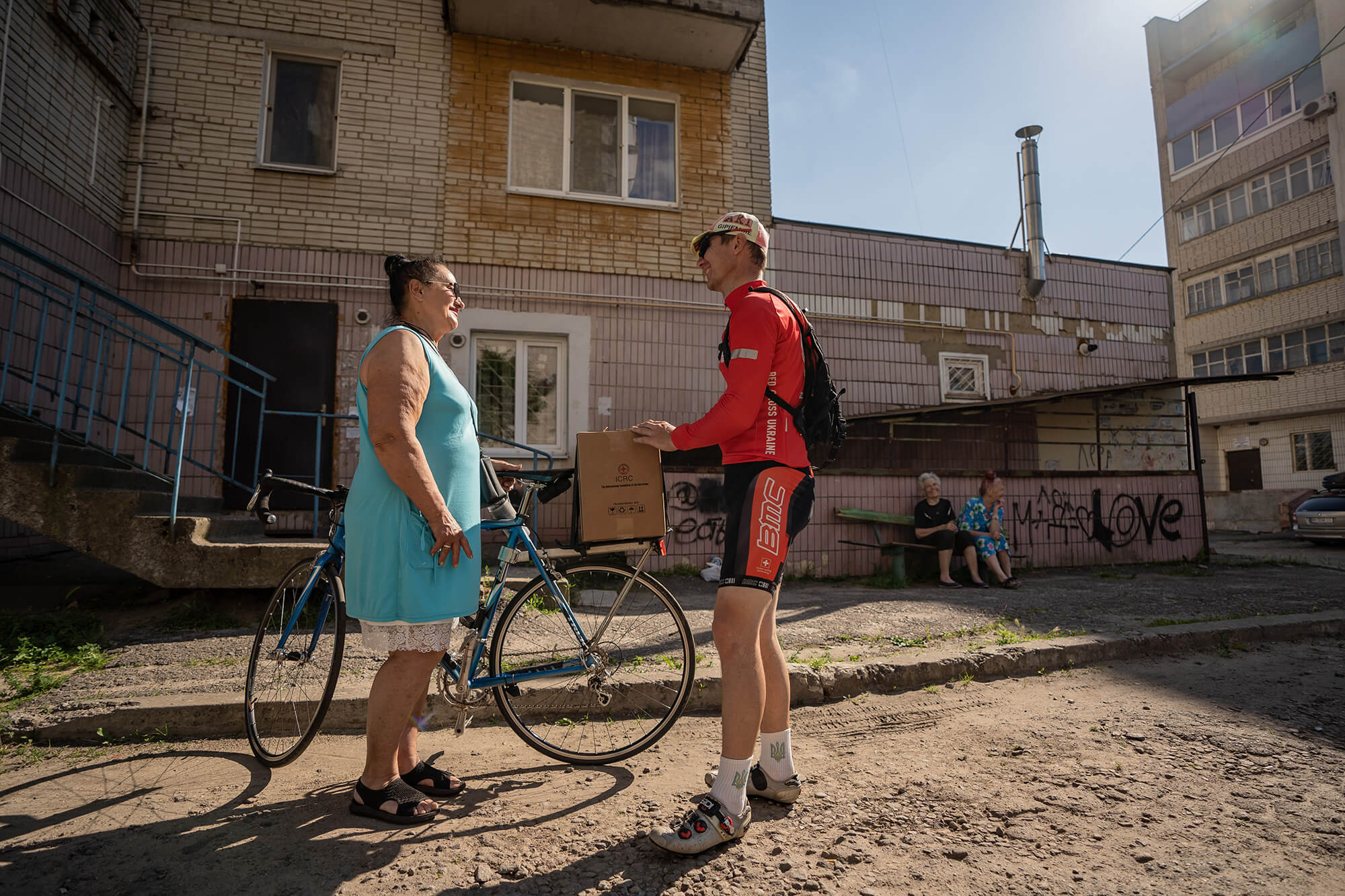
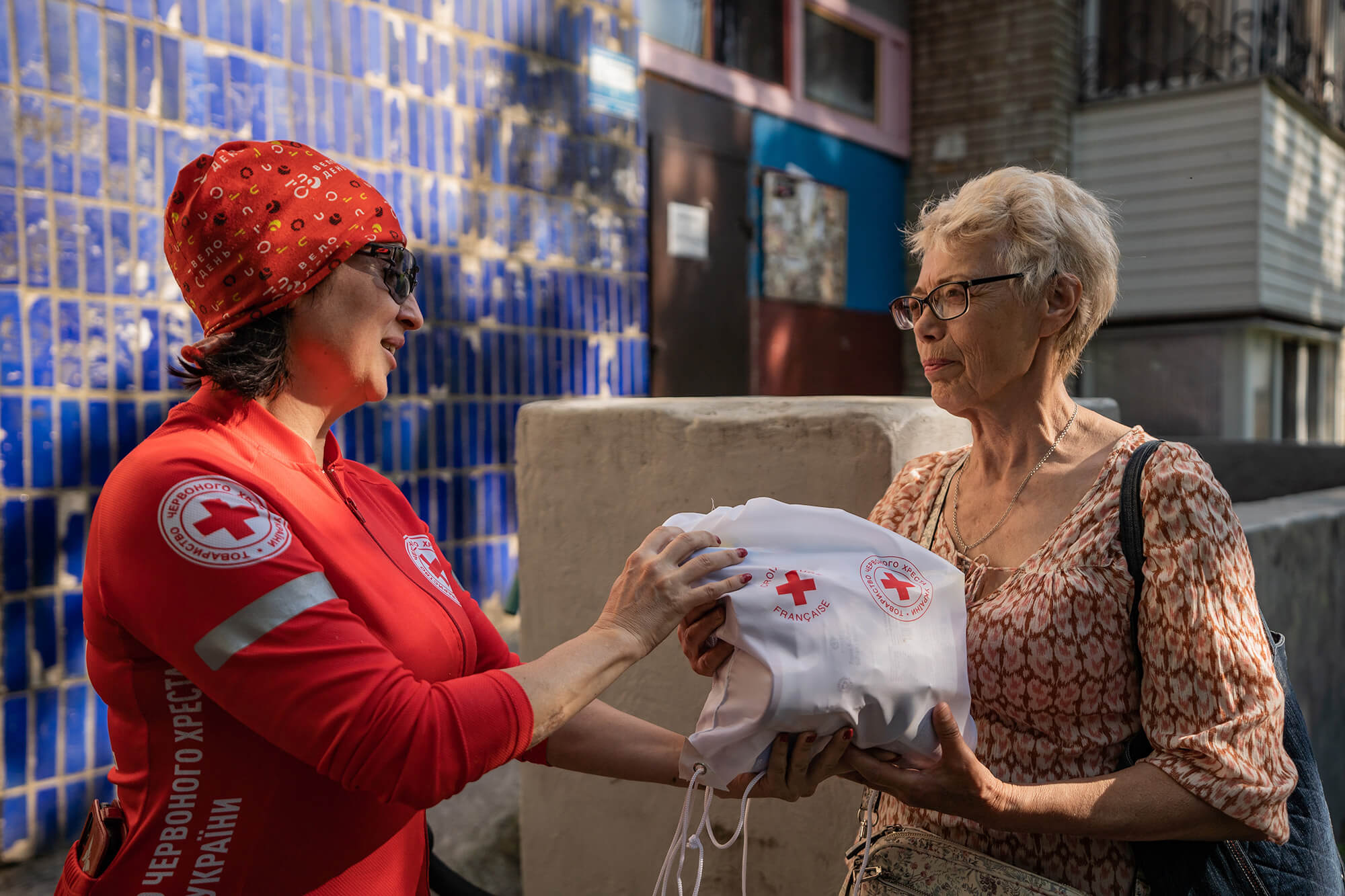
She bought her first bike, Turyst, with her first paycheck. She rode it until she was almost forty. Then Maryna bought a newer model, and around that time, she learned about the Sumy Randonneuring Club—the guys from the club helped her assemble a lighter bike out of carbon.
Maryna is 51 years old. For twenty-two years, she worked for the city pension fund. she left her job as a head of the department for the protection of the insured and was planning to move just before the full-scale invasion. By then, randonneuring had become the thing to which she devoted all her spare time.
Today, Maryna is an expert in civil aid at the Red Cross, president of the Marathon Club, a randonneuring judge, and an ultra randonneur. This means that in ten seasons, she has completed 200-, 300-, 400-, and 600-kilometer brevets within the allotted time. 600 kilometers is no limit for Maryna. Together with other club members, she rides 1,000 or even 1,200 kilometers per brevet. She plans to participate in the Paris-Brest-Paris marathon for the third time this year and hopes that Russians and Belarusians will be banned from participating.
When humanitarian aid started arriving through evacuation corridors, Maryna invited Viacheslav Zabolotnyi, her colleague from the Randonneuring Club, to join the volunteer effort. Viacheslav is a former professional cyclist. But due to some health problems he gave up the sport and started cycling for fun.
Viacheslav has eight bicycles. Randonneurs joke that it’s one bike for each day of the week plus a festive bike for holidays. But these bikes are actually part of his story. He says he would lend one of his bikes for a ride, but he’ll never sell them. It’s not that he’s greedy — he’s more sentimental and does not want the bikes that have served him so well to end up in the hands of a bad person. He works at Ukrtelecom, Ukraine’s state-owned telecommunications company. He and his colleagues often work outside the city. When the Russians set up checkpoints around Sumy on the first day of the full-scale invasion, Viacheslav and his colleagues were temporarily out of work. Viacheslav helped at another volunteer center until Maryna suggested he join the bicycle squad.
Next, she turned to Hennadiy Shynkarenko. Before the invasion, he worked as a researcher in the engineering design department of a manufacturing plant, which once was called Frunze but is now known by a five-letter acronym that no one can remember. Hennadiy was told that his services were no longer needed, so he spent all of last year volunteering for the Red Cross.
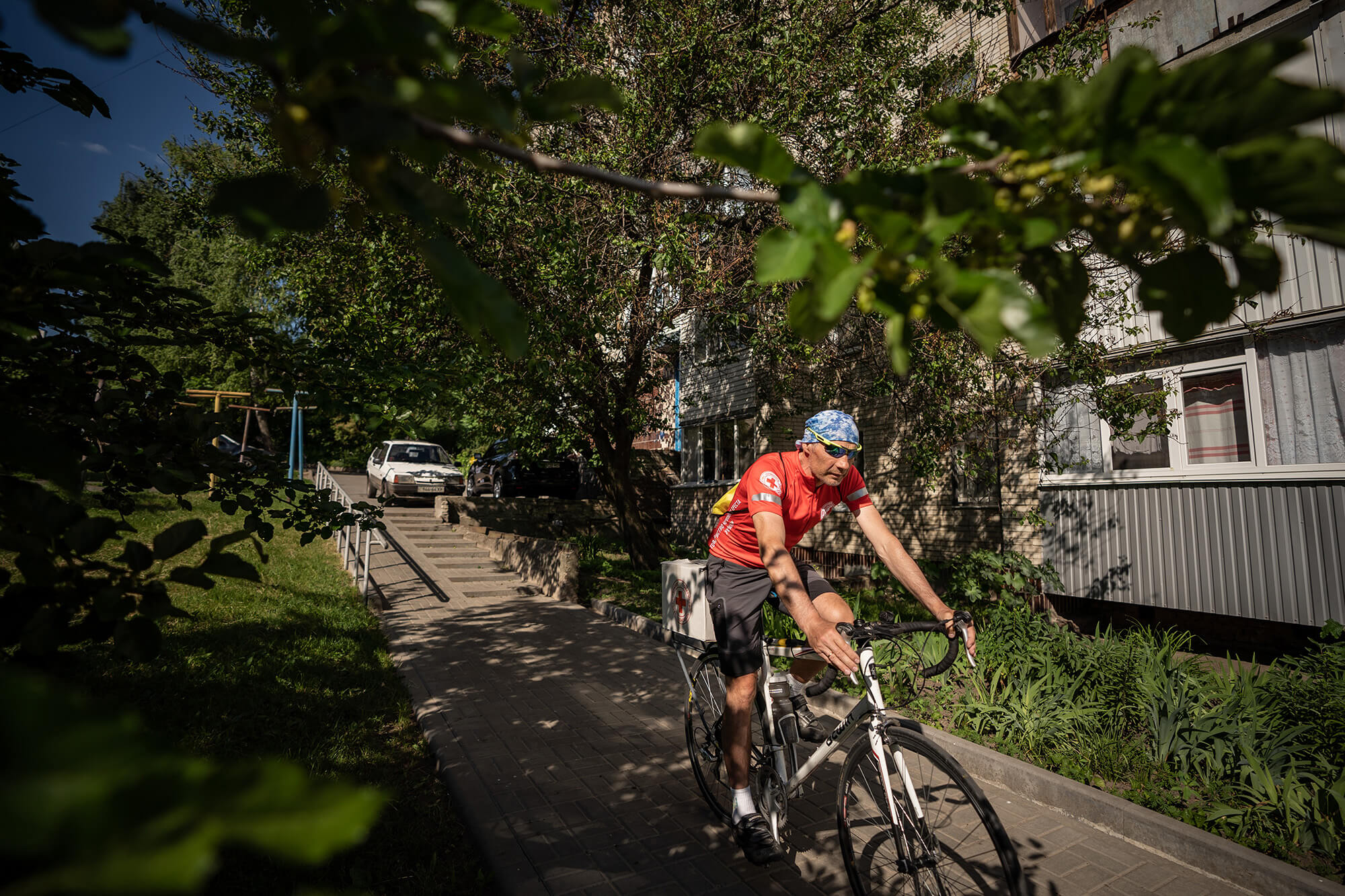
“I am not young. I’m 58. I wake up in the morning, and I can’t get myself together until I get on my bike,” he says.
From January to May 2023, he covered eight thousand kilometers on his bike—half of it delivering humanitarian aid. By the end of the year, he probably rode twenty thousand kilometers. His colleagues joke and say that most people don’t even drive that much in a year.
After Hennadiy, two other members of the Randonneuring Club, Oleksandr Provozion and Ihor Volkov, joined the Red Cross. The men evacuated their families from Sumy and returned home to help.
Oleksandr is an entrepreneur, gardener, and YouTube blogger. But these days, he has neither the time nor the energy for gardening or blogging. His family is still away, and he is caring for his disabled parents. He volunteers during the day and works in the evening.
Ihor is an electronics engineer at Sumykhimprom. When the full-scale invasion began, the chemical plant slowed down its operations, and employees were switched to a four-day week. This also gave him enough free time to volunteer. Ihor joined the Randonneuring Club during the Covid lockdown. At first, he gave in and bought a gravel bike. Then, at a local event, he picked up a leaflet where he saw the word ‘brevet’ for the first time and learned that people were riding 200, 400, or 600 kilometers at a time. Ihor wascurious. And he became even more curious when he learned that the brevet philosophy was not about competing with others: The goal was to pace yourself and cover the distance in the allotted time. Anyone who managed to do that was a winner.
Both Ihor and Oleksandr have cars, and when they hear about Hennadiy’s achievements, they list their own results: last year Ihor cycled 10 thousand kilometers and drove 2 thousand, while Oleksandr cycled 6 thousand kilometers and drove 2.2 thousand.
Along the evacuation route
Sumy region was liberated on April 4, 2022. Now the region is recovering, even though it shares a562.5 kilometer border with Russia and is shelled daily, which disrupts the lives of twenty communities, hundreds of villages and towns, and thousands of people. Members of the Sumy Randonneuring Club continue to ride brevets in the relatively quiet part of the region. But while the start of a brevet used to be a real community festival, today it’s members only— not even an announcement is made.
Each of the riders always carries a first aid kit and a tourniquet, even though they only cycle on highways. They say it’s like having an umbrella: It will notrain if you have it with you.
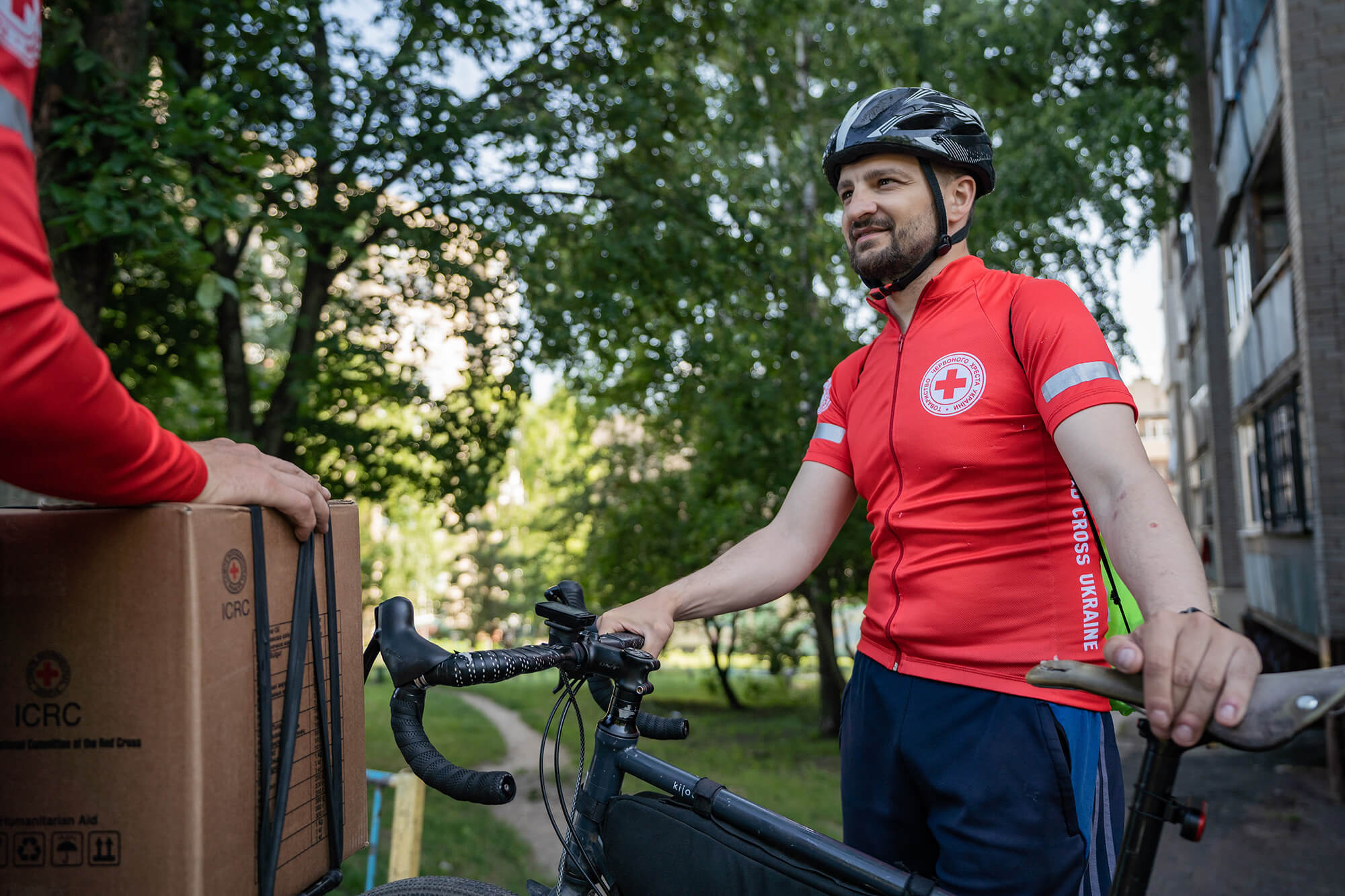
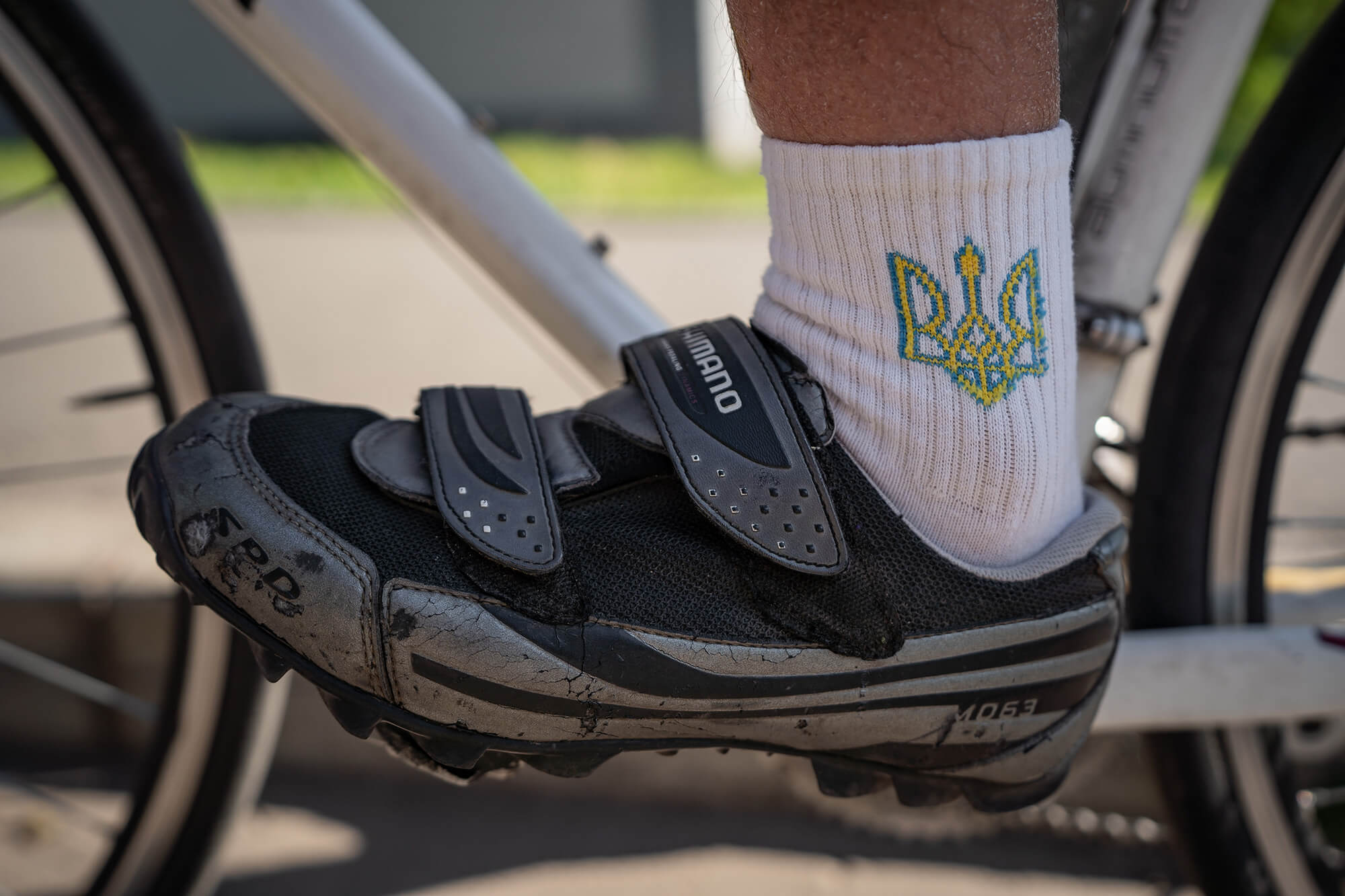
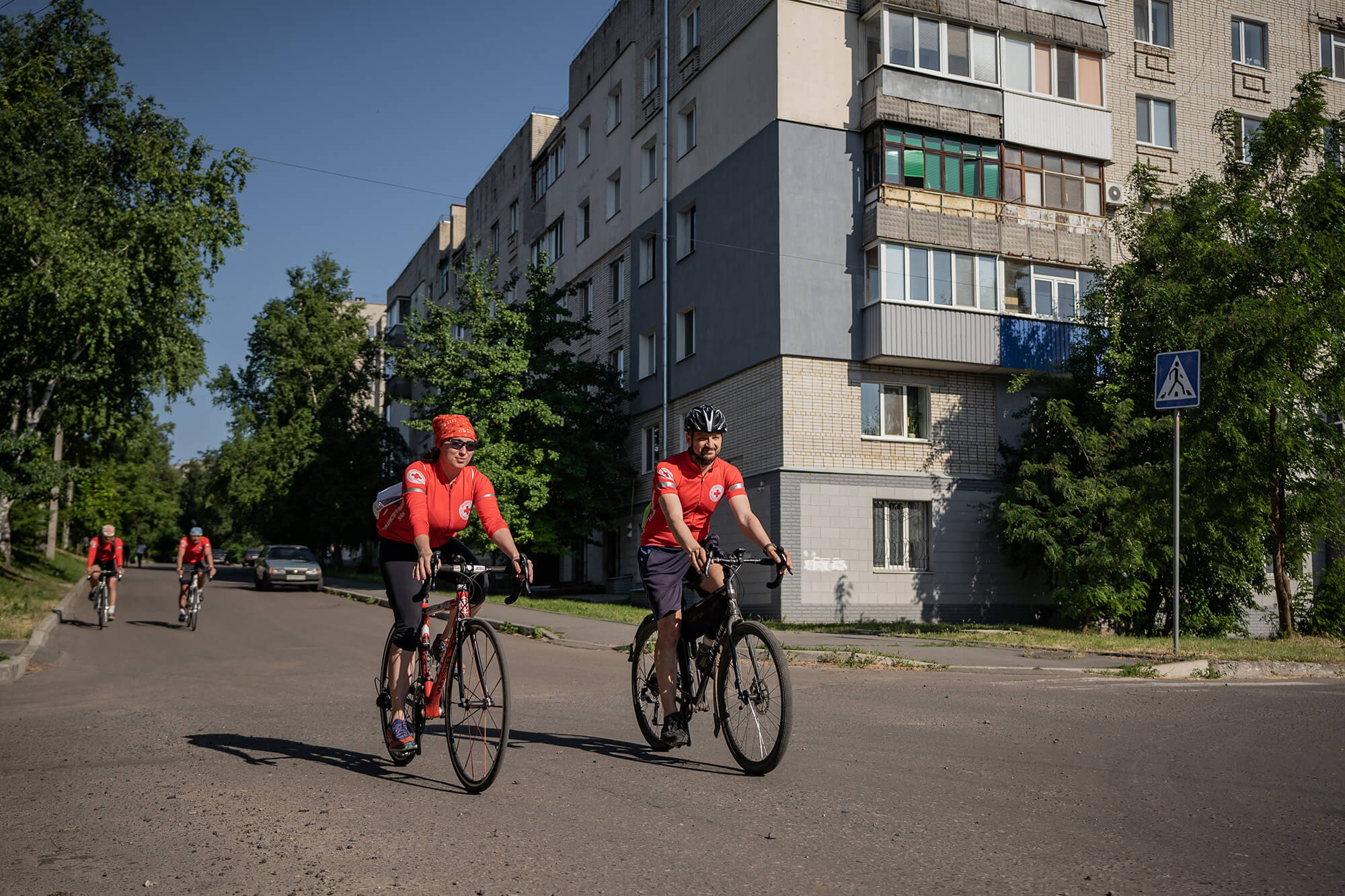
One of the recent brevets took place on a new route: from Sumy to Lokhvytsia in the Poltava region. This used to be the evacuation route from Sumy. They called this event “Crusaders on wheels.” But most of the routes are more familiar. They have been following them for many years for two reasons: out of respect for the club founders who put them together and because of the limited choice, especially now. It was difficult enough to build a route in peaceful times, let alone today. Some roads are destroyed, and some are shelled daily by the Russians. And then there is the curfew.
Randonneurs envision a post-victory dream where Sumy can be traversed from end to end by a singular bike path. They want to make the city more bike-friendly. As the war has shown, cycling is not just a sport or hobby.
In these difficult times, the Sumy randonneurs have seen that sports and hobbies not only bring people together but also make them powerful in critical moments. That’s been their experience.
“The Red Cross brought us together during the hardest days and helped us keep our sanity,” Maryna says. “We will stay here as long as it takes. Victory will not mean that no one needs help anymore. Now we need to respond quickly to what is happening and in the future we will help with rebuilding and renewal. The needs may change, but they won’t go away.”
… The men bring chairs into the office. Maryna and Oleksandr bring mugs, sweets, and coffee. They are all crusaders. But for now, they are making plans for a 400-kilometer ride.
“Shall we start from my house tomorrow?” Maryna asks.
“Only if you make coffee,” says Ihor.
“Of course, I promised! I’ll see you at 4:40am. Hennadiy, will you oil my bike chain for me?”
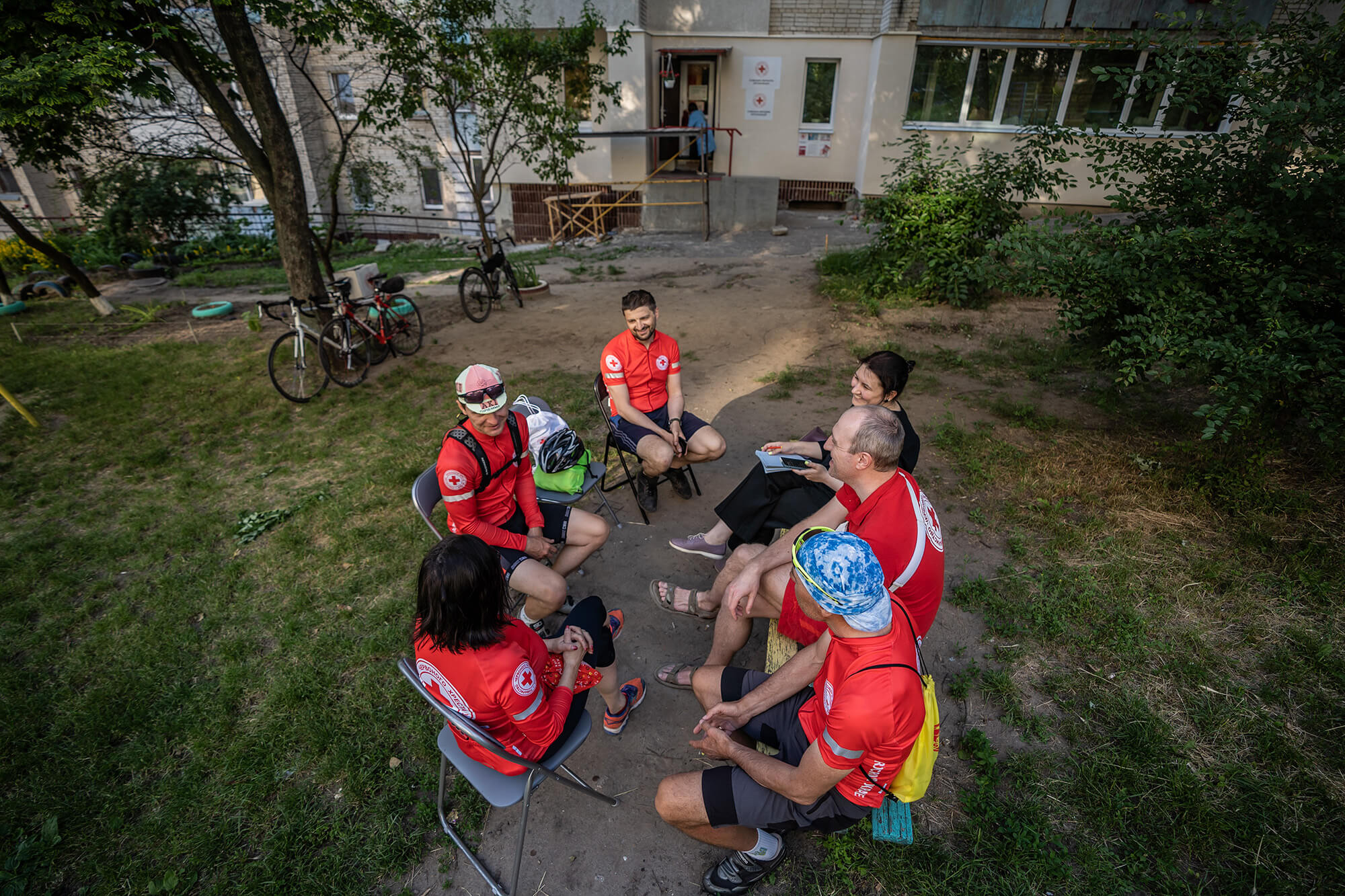
***
“Healed Lands. Зцілені землі” is part of “De-occupied: Stories of the Liberated Territories,” a project supported by the Heinrich Böll Foundation’s Bureau in Kyiv. Its goal is to show that Ukrainians are not giving up or waiting for outside help but are bringing life back to their communities and homes. Even though the war is still raging.
In these texts, we report on the renewal of life in Ukrainian territories that used to be temporarily occupied or besieged by the Russian army. We publish stories based on personal experiences of war—about people who find the strength to go on living and pass that strength on to others. About people who lead by example, inspire others, or help villages and towns recover from the war through their initiatives.
Have read to the end! What's next?
Next is a small request.
Building media in Ukraine is not an easy task. It requires special experience, knowledge and special resources. Literary reportage is also one of the most expensive genres of journalism. That's why we need your support.
We have no investors or "friendly politicians" - we’ve always been independent. The only dependence we would like to have is dependence on educated and caring readers. We invite you to support us on Patreon, so we could create more valuable things with your help.
Reports130
More






